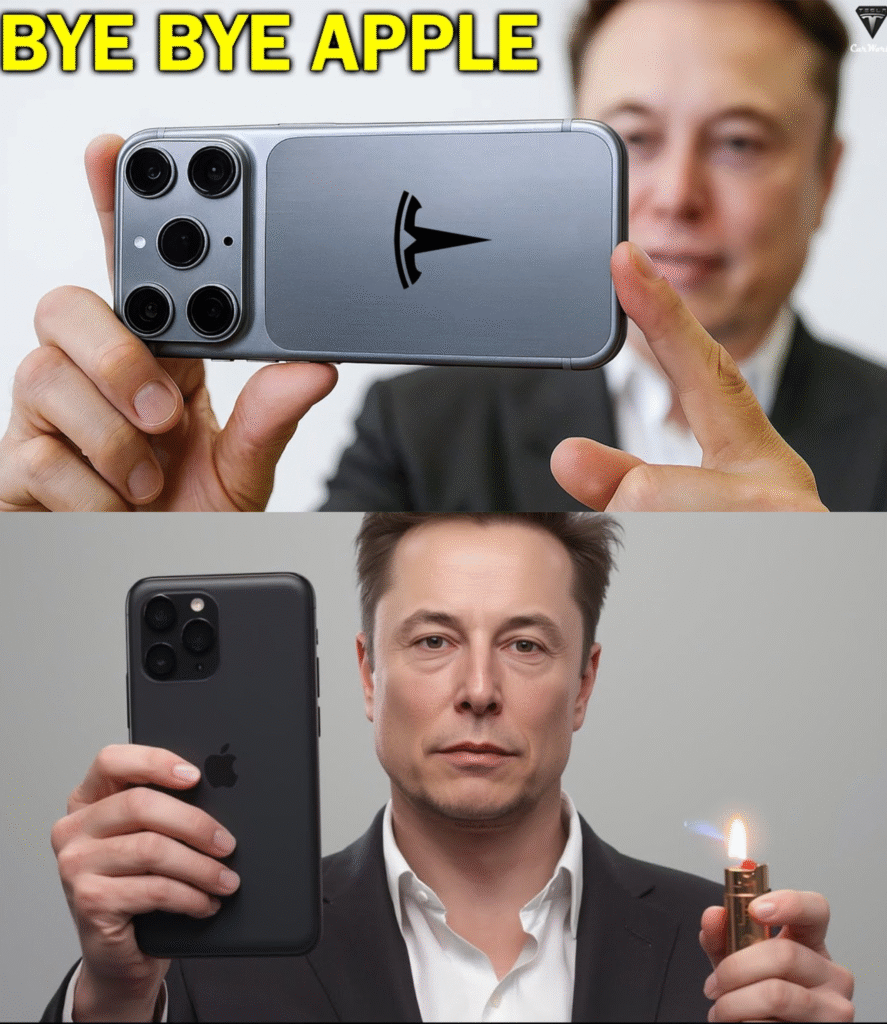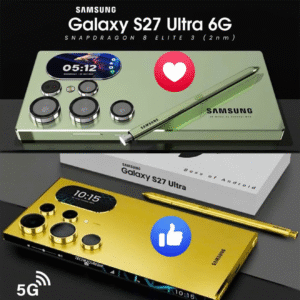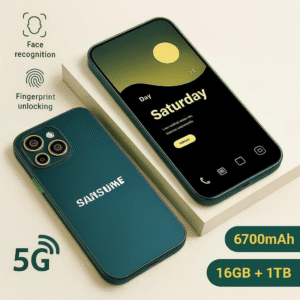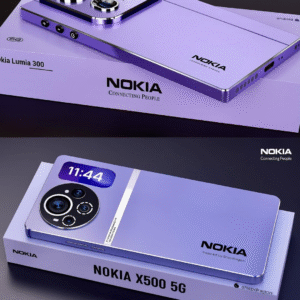
For years, rumors swirled about Elon Musk’s secretive smartphone project — whispers of a device that could shake Apple, Google, and Samsung to their very core. Now, after years of speculation and countless leaks, the Tesla Pi Phone has finally been revealed. With a $789 price tag, a titanium frame, and a giant next-gen battery, the futuristic handset is already being hailed as a potential “iPhone killer.”
But it’s not just the flashy specs that have the tech world buzzing. One hidden detail Musk unveiled during the Tesla Pi Phone’s debut has left fans and analysts stunned, sparking debate about whether Apple’s iPhone 17 might already be obsolete before it even launches.

A Titanium Beast Built for the Future
At the heart of the Pi Phone’s appeal is its aerospace-grade titanium frame, a material more often associated with rockets than smartphones. While Apple recently introduced titanium elements in the iPhone 15 Pro, Tesla has gone several steps further.
The entire chassis of the Pi Phone is forged from titanium, making it lighter, stronger, and more heat-resistant than anything on the market. Musk boasted that the phone could withstand extreme temperatures, drops from over six feet, and even electromagnetic disruptions.
“This is not just a phone,” Musk declared at the unveiling event in Austin, Texas. “It’s a survival tool for the 21st century.”
The Battery That Changes Everything
The other standout feature? A giant graphene-enhanced battery that promises to change how people think about charging.
Tesla claims the Pi Phone battery can last up to 96 hours on a single charge, dwarfing the iPhone’s average 20–24 hours. Even more impressive is the rapid wireless charging system, which reportedly restores 70% of the battery in under 15 minutes.
According to Tesla engineers, the Pi Phone battery draws inspiration from Tesla’s electric vehicle Powerwall technology. “We scaled down our energy storage innovations and put them into your pocket,” said one engineer.
Starlink Integration: A Phone Without Dead Zones
While the titanium build and massive battery grabbed headlines, what has industry insiders most intrigued is Starlink integration.
Yes, you read that correctly: the Tesla Pi Phone will connect directly to SpaceX’s Starlink satellite network, meaning users could theoretically enjoy internet access anywhere on Earth — whether on a mountaintop, in the desert, or mid-ocean.
“No more dead zones,” Musk told the crowd. “If you can see the sky, you can connect.”
This bold move directly challenges carriers like Verizon, AT&T, and T-Mobile, who may find their traditional cellular dominance shaken by a device that makes cell towers virtually obsolete.

Camera Powerhouse or Overhyped?
Tesla wasn’t shy about showing off the Pi Phone’s camera system either. The phone features a quad-lens array including:
- A 108MP main sensor
- A 50MP wide-angle lens
- A 48MP telephoto zoom
- A LiDAR scanner for AR and 3D capture
Musk teased one particularly wild feature: Astro Mode. Leveraging Starlink satellites, Astro Mode reportedly allows users to capture hyper-detailed night-sky images without external equipment. In one demo, the Pi Phone photographed Saturn’s rings in crisp detail — something no other mainstream phone has achieved.
The Hidden Detail That Shocked Everyone
Just when the crowd thought they had seen it all, Musk revealed a cryptic hidden detail that has become the biggest talking point online:
The Tesla Pi Phone will include Neuralink compatibility.
That’s right. According to Musk, the device will eventually pair with Neuralink brain–computer interface implants, allowing users to control certain features hands-free — with thoughts alone.
“This is optional,” Musk clarified. “But we’re designing the Pi Phone as the first device ready for seamless brain–tech integration.”
The announcement sparked a storm of online reactions:
- “This is the end of the iPhone. Apple is making emoji updates while Musk is out here letting us control phones with our brains.”
- “Cool… but also terrifying. Do we really want Elon Musk reading our thoughts?”
- “Forget Apple vs. Tesla, this is sci-fi vs. reality.”
Can Apple’s iPhone 17 Compete?
With the Pi Phone grabbing headlines, the spotlight has shifted uncomfortably onto Apple and its upcoming iPhone 17.
Early leaks suggest Apple’s next model will focus on incremental improvements: a better A-series chip, upgraded cameras, and minor design tweaks. But compared to Tesla’s promises of satellite internet, brain control, and week-long battery life, the iPhone 17 risks looking outdated before launch.
“Apple thrives on brand loyalty, but loyalty has limits,” said tech analyst Mark Donovan. “If Musk delivers even half of what he’s promising, Apple could face its first real existential threat in a decade.”

Public Reaction: Excitement Meets Skepticism
Social media exploded after the reveal, with hashtags like #PiPhone and #EndOfiPhone trending within minutes.
- Excitement: “$789 for a titanium phone with Starlink? I’ll sell my iPhone tomorrow,” one viral tweet read.
- Skepticism: “Tesla can’t even get Cybertruck deliveries right. Why should we believe this phone will launch on time?”
- Curiosity: “Forget the battery or titanium — tell me more about the brain control feature.”
The Bigger Picture: Musk vs. Big Tech
Musk has made no secret of his disdain for Silicon Valley giants. The Pi Phone represents more than just another gadget — it’s Musk’s challenge to Apple, Google, and the telecom industry all at once.
By undercutting Apple’s pricing, offering futuristic features, and leveraging SpaceX and Neuralink synergies, Musk is positioning Tesla as a one-stop ecosystem rival. Analysts argue this could reshape not only the smartphone market but also communications and healthcare industries if Neuralink integration goes mainstream.
Will the Pi Phone Deliver?
For all the hype, Tesla still faces enormous challenges. Manufacturing a phone at scale requires precise supply chains, software ecosystems, and customer support networks. Apple and Samsung didn’t build their empires overnight, and skeptics argue Musk’s track record of overpromising timelines could haunt the Pi Phone project.
Still, even critics admit that the reveal has lit a fire under the smartphone industry. Whether or not Tesla dethrones Apple, the very existence of the Pi Phone could push competitors to innovate faster.
The Bottom Line
At $789, with its titanium build, record-breaking battery, Starlink integration, and even hints of Neuralink brain–tech control, the Tesla Pi Phone feels less like a smartphone and more like a sci-fi leap into the future.
Apple may still have its loyal fan base, but as one tech blogger put it: “The last time a phone made people this excited was the original iPhone in 2007. The difference is, this time it’s Elon Musk on stage.”
As preorders loom and anticipation skyrockets, the question is no longer whether Tesla can build a phone — but whether the Tesla Pi Phone will redefine what a smartphone even is.





